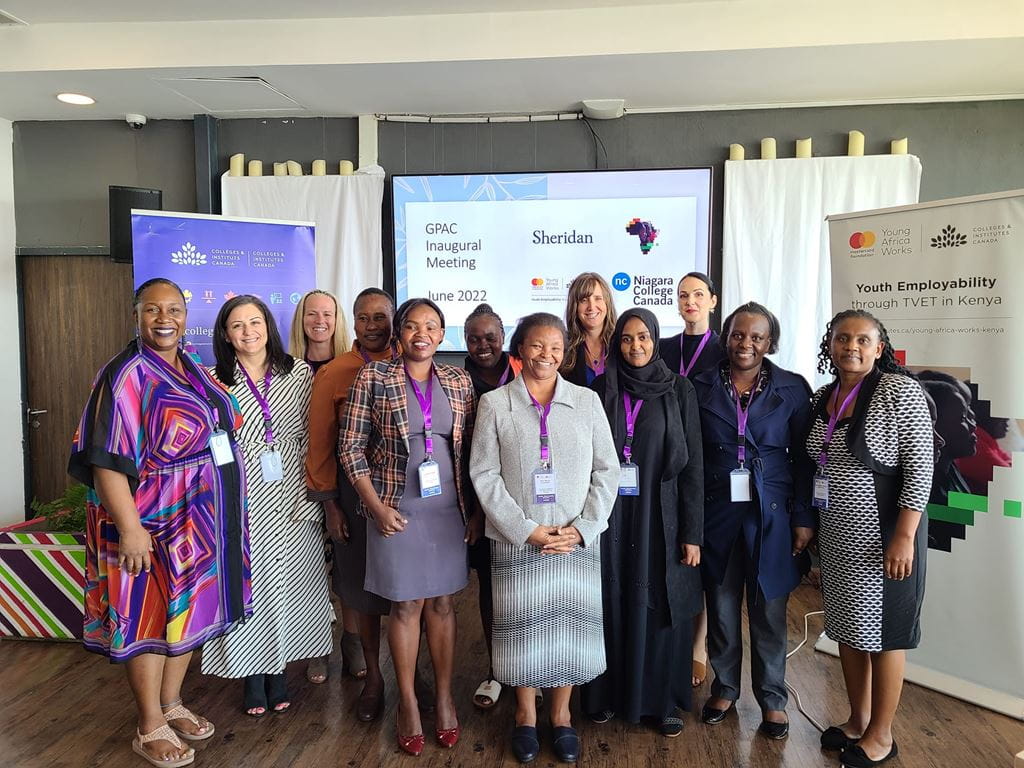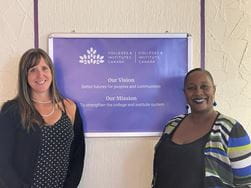
Young Africa Works – TVET 14: Gender equality policies and training – project updates and next steps
 by Lana Alrifai – Jun 17, 2022
by Lana Alrifai – Jun 17, 2022 In June 2021, Sheridan and Niagara colleges announced a partnership with the Mastercard Foundation’s Young Africa Works-Kenya: Youth Employability through Technical and Vocational Education and Training (TVET) program. The program supports TVET institutions in building a national gender equality policy and training capacity in line with the program’s goal of increasing the participation of young Kenyans, particularly young women, in market-relevant skills training programs. The program is made possible through a partnership between Colleges & Institutes Canada (CICan) and the Mastercard Foundation.
Year two milestones and updates
The TVET-14 partnership (comprised of members from Sheridan and Niagara College) focuses on establishing and strengthening policies and procedures that promote safe learning environments, particularly for female trainees and providing gender equality training to administrators and awareness workshops for government officials.
A big milestone for year two is the scheduled trip to Kenya this June where representatives from Sheridan and Niagara College will provide training to multiple stakeholders during a five-day visit to Nairobi. The TVET-14 team members will provide training to government officials and community partners such as the Ministry of Education, Technical and Vocational Education and Training Authority, Kenya Association of Manufacturers, Kenya Private Sector Alliance, TVET Curriculum Development Assessment and Certification Council (TVET-CDACC), Kenya National Qualification Authority (KNQA), and Kenya Universities and Colleges Central Placement Service (KUCCPS). Furthermore, TVET 14 will host a two-day workshop with representatives from 26 Kenyan TVET partner institutions. Those workshops will focus on:
- sharing outcomes of a comprehensive situational analysis as it pertains to gender mainstreaming within the Kenyan TVET sector and discussing key recommendations and roles of different stakeholders in advancing the gender mainstreaming process within TVET
- training on change management processes to empower participating institutions in enacting meaningful change
- introducing the Gender Equality Needs Assessment Toolkit and providing participating TVET institutions with information and tools to strengthen female participation at all levels of the institutions including employees and students
- conducting a policy awareness workshop where participants will explore socio-historical context, overarching law and policy, purpose and goals of policies
- training on EDI and inclusive education where participants will discuss EDI terms and principles within higher education and explore ways to best support the attainment of equitable and inclusive environments and approaches to education
- utilizing Gender Mainstreaming and Gender-Based Analysis Plus (GBA+) approaches to gender equality and examining common barriers to gender equality as well as strategies that support equitable and inclusive TVET institutions through a gender lens
At the end of this intensive workshop, mentors and participants will discuss the next steps for each participating institution in terms of needs assessment, policy development and training needs.
“At Sheridan we are galvanized by the incredible potential that can be achieved through empowering women and young people and ensuring that communities across the world have equal opportunities to thrive and fully benefit from the power of safe and inclusive learning environments,” said Dr. Jane Ngobia, Sheridan’s Vice President, Inclusive Communities.
“Enhancing the quality of our teaching and learning and making meaningful contributions to our local and global - “glocal” - society is a key focus of Sheridan’s Internationalization and Global Connectivity Strategy,” said Dr. Amira El Masri, Sheridan’s Global Education and Internationalization Director.
“The TVET-14 partnership has played a vital role towards meeting our goals and commitment by engaging our faculty with global research projects and providing them with lifelong learning opportunities all while ultimately contributing to a more just, sustainable and resilient world. It is also aligned with Sheridan’s commitment to the UN Sustainable Development Goals as it supports quality education (SDG goal four), decent work and economic growth (SDG goal eight), and gender equality (SDG goal five),” added Dr. El Masri.
Gender equality through collaboration
TVET-14 team members have worked collaboratively to develop a comprehensive Situational Analysis and a Needs Assessment Toolkit, which was piloted in a select number of TVET institutions in Kenya in May. The Situational Analysis reviews all policies Kenya has put in place to advance gender equality within the country. The goal of this review is to assess the impact of these policies in terms of moving gender equality forward on a systemic level. The situational analysis examines the TVET sector policies, including practices and everyday procedures to determine the status of gender mainstreaming within the sector. This aims to inform the work of TVET-14 as well as that of the different Young Africa Works in Kenya-TVET projects. The Needs Assessment Toolkit provides participating TVET institutions with information and tools to strengthen female participation at all levels of the institutions including employees and students.
 “This project has already been such a rewarding experience,” said Dr. Sara Cumming, Professor, Faculty of Humanities and Social Sciences at Sheridan. “Collaborating with cross-sector, cross-disciplinary and international colleagues has produced such rich brainstorming sessions and holistic outputs. Lending my expertise in gender, social policy and employment to Kenyan TVET institutions in an effort to increase female participation in education and employment is such an amazing opportunity that fills me with gratitude.”
“This project has already been such a rewarding experience,” said Dr. Sara Cumming, Professor, Faculty of Humanities and Social Sciences at Sheridan. “Collaborating with cross-sector, cross-disciplinary and international colleagues has produced such rich brainstorming sessions and holistic outputs. Lending my expertise in gender, social policy and employment to Kenyan TVET institutions in an effort to increase female participation in education and employment is such an amazing opportunity that fills me with gratitude.”
The team attended their first Gender Mainstreaming Committee meeting, organized by CICan in February, to officially introduce the TVET-14 members and the work done so far to support all the TVET institutions.
Next steps
As it enters its second year, the TVET-14 partnership will provide tailored gender equality training to TVET administrators, gender champions, policymakers in government and business leaders. This training program is designed to enhance the technical capacity of the trainees, inform policymaking and inspire an institutional culture for a safe, inclusive and secure learning environment through the application of gender mainstreaming methodologies. The program also aims to influence the formulation of policies and procedures that increase access to dignified and fulfilling work for young women.
“Working together towards gender mainstreaming in TVET Institutions in Kenya has been the highlight of the year for me,” said Michaelann George, Professor in the Faculty of Applied Health and Community Studies at Sheridan. “I look forward to continuing the already great work that has been done within TVET to strengthen women’s access and equity in education.”
Social Media links:
- The Mastercard Foundation’s Twitter (@MastercardFdn)
- The Mastercard Foundation’s Facebook (@MastercardFoundation)
- The Mastercard Foundation’s LinkedIn
- The Mastercard Foundation’s Instagram (@MastercardFoundation)
- The Mastercard Foundation’s YouTube Channel
Hashtags:
#YoungAfricaWorks
#youthemployment
Media Contact
For media inquiries, contact Sheridan’s Communications and Public Relations team.



